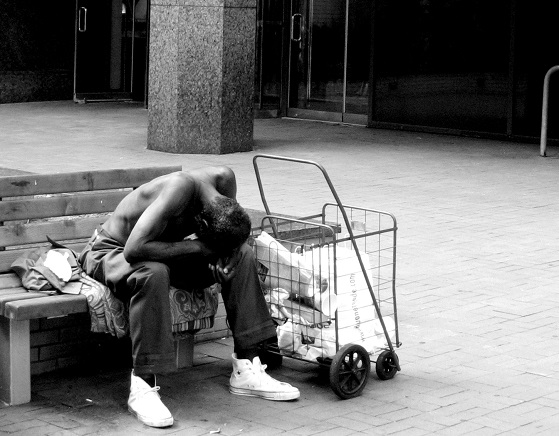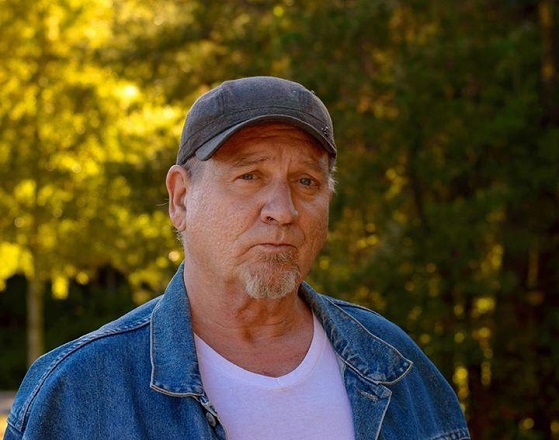From Hobos to Homeys: My Homeless Experience.

{source}
While I was staying at the Asbury Park Rescue Mission, a homeless shelter in New Jersey, I read about a Jersey Shore storytelling event and that the topic would be home.
So I contacted the program’s director and told her I’d like to riff on that. She said yes. The following is my written account of what I improvised that night.
The truth is that I’ve been homeless most of my adult life — by choice when I was younger, but not so much now.
I left the traditional mom-pop-bro-sis family scene when I was 17 in order to play basketball for the University of Miami. I had dedicated myself to the game because I knew it was a viable way for me to leave home and get out on my own.
The only previous experiences I had of feeling untethered to the regular confines of life was when I would drop acid and just wander wherever Lucy in the Sky with Diamonds would take me.
Often we wound up in pleasant musical discoveries and sexual adventures, and sometimes we’d just sit and gaze into the sky, wondering what life was all about and why so many people felt unhappy about it except when they were complaining about it.
I fast lost interest in playing collegiate basketball. How fast? The homeys who drove me to the airport in Newark made sure that I was sufficiently lit up for such a journey. As I recall it, a couple capsules of chocolate mescaline and a few joints.
Because I was a scholarship athlete, the Jock Squad picked me up in Miami and drove me to a frat party. Interfacing with frat boys and sorority sisters on acid is not advisable. It magnifies the shallowness.
I woke up with a blonde in bed next to me who asked me what my father did for a living. I just shrugged my shoulders. He went to work in some factory in the morning and returned in the evenings and never really talked about it.
I was a writer then in search of some way to learn the skills and knowledge of the business to make a living doing it. I enrolled in one creative writing class and had sharp enough instincts at the time to leave it before it did any long-term damage.
What I felt I needed to do was find a way to make enough money to buy me time to write. I’d figure it out for myself by doing it. Miami being Miami, I connected with people who were professional smugglers. Being the 70’s, marijuana was a hot commodity, but so was unpolished lapis lazuli, raw cotton, ginseng, and a host of other items.
The way it worked is that whenever some countries made a trade pact or engaged in a trade war, it made some products hard to get, though still in demand. If you could find them and match them up with buyers, you were in business.
This formula worked for me and I started working on my first novel.
Fast forward to the 90’s and I’m living in Times Square with the ageing parents of one of my smuggling colleagues. This is just about when the city started selling off Times Square to the Disney Corporation and other large-scale commercial entities.
The way it worked was if you were willing to invest a hundred grand or more in this redevelopment of Times Square, the Federal Government would match you dollar for dollar. It got crazy. Buildings being torn town in the middle of the night, threats of arson…
I moved from there to the Kripalu Center for Yoga and Health in the Berkshire Hills of Massachusetts, where I met Yogi Amrit Desai, the founder of Kripalu Yoga, and became his book editor and friend.
Some 30 years later, I would tour India with him and write An American Yoga: The Kripalu Story. Since it was published in 20111, I have received royalties every month since. Not a lot, but it means that people are reading it and telling others to read it. That’s gratifying.
When I left Kripalu and the Berkshires, I moved to Canada to continue working on the novel I started.
I also wanted to leave America when Ronald Reagan became President. He declared and financed a war on drugs that saw several of my close friends go to jail and have their family lives wrecked. My colleagues who smuggled marijuana were hippies trying to make a modest living, not gunslingers trying to become rich. My novel was about this very thing.
When I finished the novel , I went back to NYC to meet with a publisher who expressed interest, but the Times Square property was tied up in intense litigation with Trump-type real estate moguls who were going after it with unchecked greed. These were dangerously ruthless people.
I took a train to Elizabeth, NJ where an uncle lived alone. When I got off the train, I recognized someone with whom I grew up and played high school basketball. He was laid out on a piece of cardboard in the corner of a vacant macadam lot. I walked toward him and called out his name, Ollie!
His eyes were bloodshot and his gaze was blank. He was shell-shocked. I felt shocked myself from seeing so many homeless people on the streets in NYC , but none of that hit home like this. It seemed obvious to me that being homeless was now a part of the American experience. The question to myself was: do I fear this, or learn how to deal with it?
The publisher was in no rush to meet with me, and asked how I was enjoying my stay in NY. I was broke, so I signed up to participate in a clinical drug study at a hospital in Newark. You stay a week or two, and can walk away with a grand or more.
There I shared a room with Brother Marsallis, a homeless Rasta who lived between Baltimore and Newark. I told him about Ollie and he said, “Sure enough, Mon, everybody in America is gonna be living on the streets soon.”
It’s funny how the regular use of strong pot can make you euphoric and apocalyptic at the same time.
He took me to an abandoned warehouse loft in Newark that was now being commandeered by a band of Rastas who secured it with grit and firearms.
Through them I discovered an underground network of street artists who traveled around the country staying in these kinds of urban and rural safe-houses while they tried to sell their work — graffiti art, poetry, music, rap, street performance, novels.
There was a star-rating system for street-people. Five was tops and one was lowest. If you went to shelters or food pantries, begged or panhandled, came back from charities spouting religious jargon, you were on the bottom and would not be allowed to stay in the loft.
Self-sufficiency and how you handled yourself and dealt with others is what earned you stars. I had money from the drug study and a novel to sell. I worked up to a four. This was similar to the 1869 Hobo Code of Conduct that included these rules for the road:
Decide your own life, don’t let another person run or rule you… When in town, always respect the local law and officials, and try to be a gentleman at all times… Don’t take advantage of someone who is in a vulnerable situation, be they locals or other hobos… Always try to find work, even if temporary, and always seek out jobs nobody wants. By doing so you not only help a business along, but ensure employment should you return to that town again. When no employment is available, make your own work by using your additional talents at crafts. Do not allow yourself to become a stupid drunk and set a bad example for locals’ treatment of other hobos.
In time, I finished a quartet of novels. A review of them appeared in an article on Books That Don’t Suck:
“Mr. James Abro’s quartet of novels offers a spellbinding anecdotal recounting of life in America from the end of the 60’s to the present. From the race riots to spiritual communities, from the jungles of Nicaragua to the boardrooms of the Federal Reserve, Mr. Abro peers fearlessly into the side-pockets of American life. The final scene in this tour de force of life imitating art and vice versa will leave you struck with pathos for the fading American dream.”
My audience was other writers and anarchists. Can’t build a viable writing career with just that.
While I was in India researching the Kripalu story, I called my 86-year-old mother to see how she was doing. She asked me if I was going to stop by later. Something was wrong. I cut my trip short and spent the next two years taking care of my mother who was diagnosed with Alzheimer’s.
After she passed on, I was worn out and spent physically, emotionally and financially. I became unwillingly homeless for the first time in my life, and in many ways I am still recovering from that experience. My point in sharing this story is to show that there are many different kinds of ways to be homeless and many different kinds of people who are.

